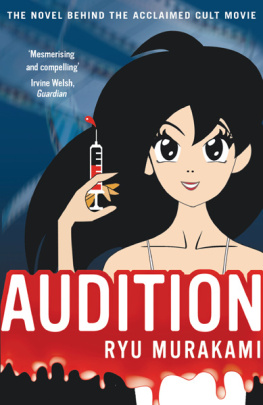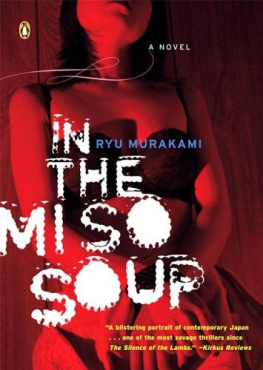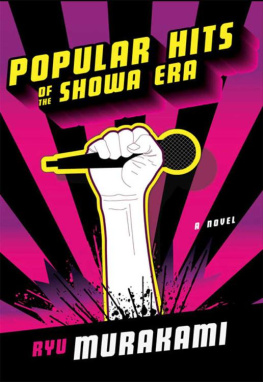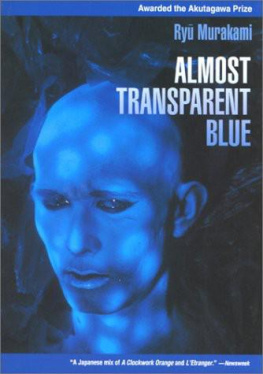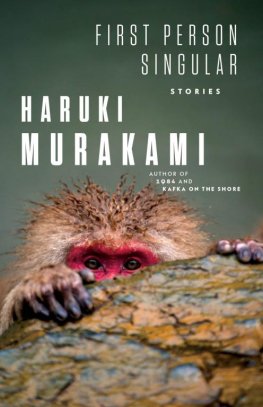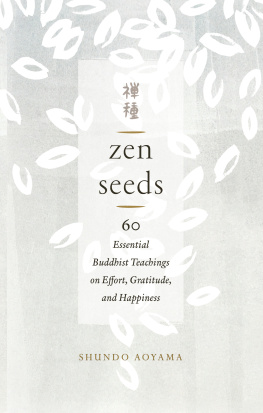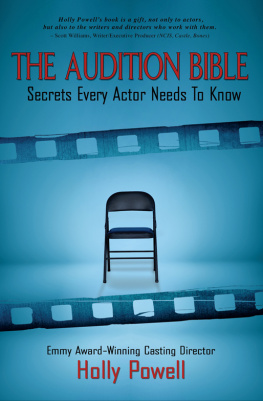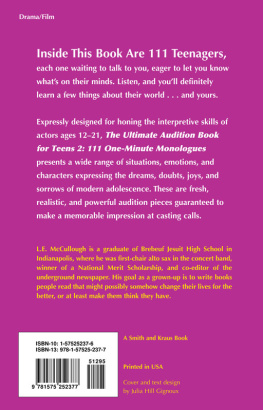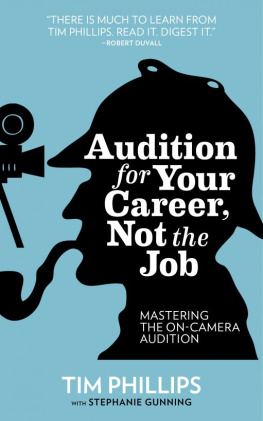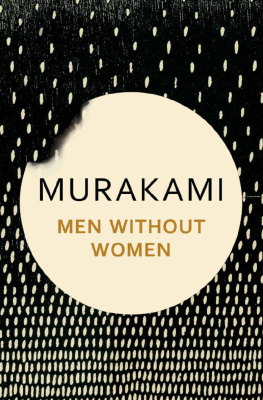AUDITION
Ryu Murakami
First published in Great Britain 2009
This electronic edition published 2010 by Bloomsbury Publishing Plc
Copyright 2009 by Ryu Murakami
Translation copyright 2009 by Ralph McCarthy
The moral right of the author has been asserted
All rights reserved. You may not copy, distribute, transmit, reproduce or otherwise
make available this publication (or any part of it) in any form, or by any means
(including without limitation electronic, digital, optical, mechanical, photocopying,
printing, recording or otherwise), without the prior written permission of the publisher.
Any person who does any unauthorised act in relation to this publication
may be liable to criminal prosecution and civil claims for damages.
Bloomsbury Publishing Plc, 36 Soho Square, London W1D 3QY
A CIP catalogue record for this book is available from the British Library
ISBN 9781408810132
www.bloomsbury.com/ryumurakami
Visit www.bloomsbury.com to find out more about our authors and their books.
You will find extracts, authors interviews, author events and you can sign up
for newsletters to be the first to hear about our latest releases and special offers.
Why dont you find yourself a new wife, Pops?
It was this question, posed by his son, Shige, that precipitated Aoyamas decision to remarry.
Shiges mother, Ryoko, had died of a viral cancer some seven years before, when he was eight and Aoyama thirty-five. Because of her relative youth, Ryokos cancer had spread rapidly. She was operated on once, but recurrence was almost immediate, and within a month it was all over.
She didnt have time to suffer, or even to grieve, Aoyama had told a close friend at the time.
Ryokos father was the owner of a venerable little firm that had been manufacturing fine musical instruments for generations. He and his wife, devotees of jazz and classical music, had raised their only daughter in a strict but loving household. Ryoko was cultured, intelligent and strikingly attractive. She was also a woman of great inner strength, and as a wife shed been quietly supportive of Aoyama in every aspect of his life and career. He would never forget that it was only because of her help and understanding that hed succeeded in his Great Adventure: leaving the giant ad agency where hed worked for more than a decade to start his own video production company.
Although this was during the bubble years, when it seemed to be raining money, the sheer number of fledgling production companies ensured fierce competition, and for many months Aoyamas adventure had teetered on the brink of bankruptcy. Ryokos father was the one whod saved him. His firm had designed and built pipe organs for Catholic churches throughout South-East Asia, where VCRs were just beginning to proliferate, and Aoyama hit upon the idea of producing a simple visual presentation of scenes from the New Testament. Dubbed into the various languages, these videos sold literally hundreds of thousands of copies thanks almost entirely to the old mans connections.
Many wives might have made a point of dangling something like that over their husbands heads, but not the ever-modest and self-effacing Ryoko. Naturally, Aoyama had nothing but love, respect and gratitude for this remarkable wife of his, and yet it is also true that ever since his days at the agency hed been rather extravagantly unfaithful to her. The most critical instance had occurred just after the Jesus video took off, when he got entangled with a nightclub hostess to the tune of millions of yen. But even then Ryoko had maintained her cool and her quiet dignity, and no serious fights ever occurred in the home. Her main priorities first, last and always were Shiges well-being and education.
What husband has never speculated how free he might feel if his wife were suddenly out of the picture? And how many count the days till she takes the kids off for a week with her folks? Let these men actually lose their wives, however, and few can even summon the will or energy to run wild; its only then that they recognise the support system theyve been taking for granted. When Aoyama lost Ryoko he became mired in feelings of utter powerlessness. Eventually hed consulted with a physician friend, who warned him he was just a step shy of clinical depression. You really will get ill if you dont set some positive goals for yourself, this friend had said, and Aoyama set himself two.
One was to spend as much time as possible with his son. Shige was in a similar state of shock, devastated by his mothers death, and Aoyama conscientiously went about finding things the two of them could do together. He bought a baseball and gloves, honed his skill at video games and watched more movies than he had in years. But, because hed always entrusted the business of raising the boy to Ryoko, it took weeks before he really felt they were getting to know each other. Swimming was one activity that provided them with a lot of quality time. Aoyama took out a membership at a local sports club and the two of them swam in the pool almost every evening. Shige had been intimidated by the water but his father patiently helped him overcome his fear, teaching him first breaststroke and then the crawl.
It was some six months after Ryokos death, when Shige had got to the point where he could swim a hundred metres crawl, that Aoyama realised they were both finally on the road to recovery. Ryoko had died in midwinter, and now it was the rainy season. Walking through the car park of the sports club, Shige pointed at a cluster of hydrangeas and said, Pretty, arent they, Daddy? They really were pretty, Aoyama thought. The vivid purple of the blossoms was something he could almost feel in the pleasant, after-swim fatigue of his body. It had been a long time since he or Shige had been able to appreciate things like flowers.
His second goal was to bring a certain legendary pipe organist to Japan. This elderly musician, whod lived all her life in eastern Germany, was known to enthusiasts worldwide without ever having given a commercial recital. Aoyama launched his quest by carefully composing a long letter to her, researching the history of Christianity, the life of Bach and the culture of medieval Europe as he went. He had the letter translated into German, began studying the language himself and even started investigating possible venues for her to perform in. Promoters tended to laugh him out of the room the moment he mentioned the elderly virtuosos name, but Aoyama was determined to succeed and through his own efforts alone. He didnt enlist the help of Ryokos father, or even let the old man know what he was up to. And when, after two years of sending letters without any indication that she was reading them, he finally received a reply and although the reply was a simple, polite refusal to perform, Aoyama literally shed tears of joy. He continued writing to her, dozens of letters to the effect that it was our duty as Believers to record and commemorate, with state-of-the-art technology, her performance on an instrument of the finest quality. Aoyama didnt actually believe in God, but his experience with the Jesus video had served him well, and five years after hed sent the first letter he was able to bring the legendary artist to Japan. She performed a free, one-time-only concert at the auditorium of a music school in Mejiro, and Aoyama recorded the event on both video and film. No one was more delighted about this triumph than Ryokos father, who understood well what it symbolised to his son-in-law: a final requiem for Ryoko and the beginning of a new life.
At fifteen, Shige was already taller than Aoyamas 174 centimetres and a much faster swimmer of both the crawl and breaststroke. Theyd both begun playing tennis the year after Ryokos death, but of course Shige, who took after his mother in both looks and character, had made much quicker progress. The two of them stayed on in the house in Suginami-ku, a substantial home on an 800-square-metre lot that Aoyama rented from an acquaintance of Ryokos father. The owner was an ancient gentleman whod once composed popular songs and who now lived at the foot of Mount Fuji, in a retirement home with its own hot springs. The rent roughly half a million yen a month was easily affordable now that Aoyamas firm was well established. At his office, in a building on Meiji Boulevard in Shibuya, he employed a staff of fourteen.
Next page
